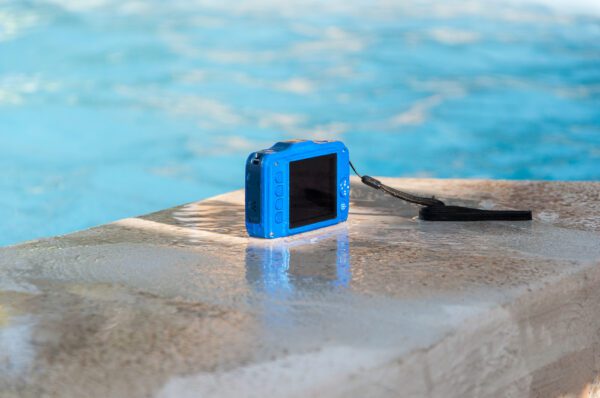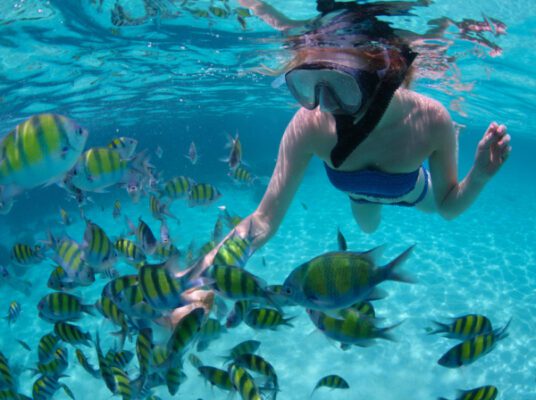You work hard to pull off a fun, successful family vacation, and you want to make sure to capture all of those magical memories for years to come. And that’s true for both in and out of the water! If you’re planning a family vacation that involves water activities such as swimming, snorkeling, or diving, you’ll want to make sure you have the right camera to capture all of your family’s memories.

You don’t want to miss out on capturing your family’s water adventures, but you also don’t want to risk ruining your camera. Plus, blurry or out-of-focus photos can be disappointing and fail to capture the true beauty of the moment. A waterproof camera is a perfect solution for capturing high-quality photos and videos during water activities. With the right camera, you can take stunning underwater shots without worrying about damaging your device.
Don’t let your family’s water adventures go undocumented. Keep reading to learn how a waterproof camera can be a great addition to your next vacation.
What are Waterproof Cameras?
If you enjoy outdoor activities such as swimming, snorkeling, or surfing, you may want to capture those moments with a camera. However, taking a regular camera to these activities can be risky as water can damage it. And, depending on the circumstances, that damage may not be covered by your travel insurance. This is where a waterproof camera comes in.
Waterproof cameras are specifically designed for use in wet environments, such as underwater or in rainy conditions. They are built with airtight seals to keep water from the camera’s internal components.
You can use these cameras in many conditions besides underwater photography. For example, you can use them to take photos while kayaking or rafting or hiking through caves and waterfalls.

Types of Waterproof Cameras
There are various types of underwater cameras to choose from, each with its own unique features and benefits. Let’s explore some of the most popular options.
Compact Cameras
Compact cameras are small and lightweight, making them easy to carry around. They are designed for casual photographers who want to take photos and videos underwater or in other wet environments. They come in different sizes and shapes, and they have varying levels of waterproofing. Some are waterproof up to a few meters, while others can go deeper.
Compact cameras are a great choice if you’re just getting started with underwater photography, and they are often more affordable than other options. These cameras provide a versatile solution when you need to travel light, without compromising too much on image quality.
Action Cameras
Action cameras are designed for people who want to capture their adventures in extreme conditions. They are small, rugged, and can be mounted on helmets, bikes, or other equipment. Action cameras are waterproof and shockproof, making them ideal for use in extreme sports such as surfing, snowboarding, or skydiving.
Some action cameras can shoot 4K video with advanced features such as image stabilization and slow-motion video. They also have a wide-angle lens that captures more of the scene, making them ideal for action shots.
While they may not offer the same high-end image quality as DSLRs or mirrorless cameras, action cameras are easy to use and highly versatile, allowing you to capture your underwater adventures from unique perspectives.
Traditional High-End Cameras
Note that both mirrorless and DSLR cameras typically require the separate purchase of a special underwater housing that can be expensive.
Mirrorless Cameras
Mirrorless cameras have become increasingly popular among underwater photographers due to their lightweight design, high-quality images, and wide range of lens options. By design, they tend to offer more image stabilization than the typical DSLR camera. These cameras offer the functionality of DSLRs without the bulk.
DSLR Cameras
If you’re a true photography enthusiast looking for top-notch image quality, a DSLR camera might be the right choice. DSLR cameras offer excellent image quality and the flexibility to change lenses for various shooting conditions. Keep in mind that DSLRs are usually larger and heavier than other types of cameras, so make sure you’re prepared to handle the added weight and size underwater.

Disposable Underwater Cameras
For those who want a simple, no-fuss option for capturing memories underwater, disposable cameras are an affordable alternative. These cameras are designed to be used once and thrown away after you’ve finished your roll of film.
Not surprisingly, disposable cameras usually don’t offer the same image quality as other options, but they can be a fun and easy way to document your underwater experiences without worrying about damaging more expensive equipment. They are also a great option for kid who want to explore underwater photography.
Disadvantages of Waterproof Cameras
While waterproof cameras have many benefits, they also come with a few disadvantages.
One of the main disadvantages of waterproof cameras is that they often have smaller sensors than their non-waterproof counterparts. This can result in lower image quality, especially in low-light situations. Additionally, waterproof cameras may not have as many manual controls as other cameras, making it more difficult to fine-tune your settings for the perfect shot.
Another disadvantage of waterproof cameras is that they can be more expensive than non-waterproof cameras with similar features. Additionally, while waterproof cameras are designed to handle tough conditions, they are not indestructible. They can still be damaged if dropped or mishandled, and repairs can be costly.
Finally, some waterproof cameras may be bulkier and heavier than other cameras, making them less convenient to carry around. This can be a drawback if you’re looking for a camera that is easy to take with you on the go.

Factors to Consider When Buying a Waterproof Camera
Here are some factors to consider when buying a waterproof camera:
Waterproof Depth Rating
The waterproof rating of a camera is one of the most critical factors to consider. The rating indicates how deep the camera can go underwater without getting damaged. Most waterproof cameras have a depth rating of at least 10 feet and many have a rating of up to 33 feet. These ranges are usually sufficient for snorkeling and swimming. However, if you plan to dive deeper, you should look for a camera with a higher depth rating.
Image Quality
The image quality of a camera is another crucial factor to consider. Look for a camera with a high resolution and a good sensor size. A camera with a high resolution will produce sharper and more detailed images, while a larger sensor size will capture more light, resulting in better image quality in low-light conditions.
Another feature to consider is the camera’s lens. Look for a camera with a wide-angle lens, allowing you to capture more of the scene in a single shot. A camera with a zoom lens will also be useful, allowing you to get closer to your subject without moving closer physically.
Of course, additional features usually come along with an increased price tag.
Stability and Autofocus
Underwater photography can be challenging due to water currents and the movement of marine life. A camera with a fast and accurate autofocus system helps you capture sharp images of moving subjects. Additionally, image stabilization helps reduce motion blur and ensures crisp photos.
Video Capabilities
If you’re interested in capturing underwater video, make sure your camera has high-quality video features. 4K resolution is becoming more popular and offers impressive detail and clarity. Also, look for cameras with high frame rates to capture smooth, slow-motion footage. Stabilization and autofocus features are just as important for video as they are for still images.
Ease of Use
When buying a waterproof camera, it is essential to consider its ease of use. Look for a camera with large buttons that are easy to press, even when wearing gloves. The camera’s controls should be intuitive and easy to navigate, allowing you to adjust settings quickly and easily.
Another feature to consider is the camera’s display. Look for a camera with a bright and clear display that is easy to see in bright sunlight. A camera with a touchscreen display will also be useful, allowing you to navigate the camera’s menus and settings more easily.
Additionally, cameras with built-in Wi-Fi or Bluetooth connectivity can make transferring and sharing your photos and videos a breeze when you’re back on dry land.
Price
Finally, for most of us, price is always an important consideration! Waterproof cameras can range in price from a few hundred dollars to over a thousand dollars. Look for a camera that fits your budget while still meeting your needs. Remember that more expensive cameras will often have better image quality and more advanced features, but they may not be necessary for your needs.
Bestselling Waterproof Cameras (Amazon)
- 【4K UHD Waterproof Camera】 Experience the thrill of underwater exploration with our 4K waterproof camera. With a stunning 4K video and 56MP photo resolution, it captures every aquatic adventure in crisp, breathtaking detail. Perfect for...
- 【Autofocus Underwater Camera】 Unleash your inner photographer with our underwater camera. Equipped with an intuitive autofocus function, it's as simple as half-pressing the shutter to focus - watch for the focus frame turning green on...
- Waterproof to 15m (49') - 2m (6') Shockproof Rating - Dustproof
- WiFi Connectivity - 1080P Full HD Video - Vlogging Camera
- 4K Ultra HD action camera: Professional 4K30Fps & 2.7K30Fps video with 20MP photos at up to 30 frames per second for incredible photos, which is 4 times the resolution of traditional HD cameras.
- Smooth Stabilization: Built-in Electronic Image Stabilization (EIS) delivers steady and smooth videos. It can enable excellent footage even you or the object is in fast-moving.
A Disposable Waterproof Camera: Is It Worth It?
Since an underwater camera can be pricey, you may be hesitant to make that investment – particularly if you won’t have many opportunities to use it. That’s where disposable waterproof cameras come in. Disposable waterproof cameras are affordable and convenient.
They allow you to take pictures underwater without worrying about damaging your expensive camera.
Plus, disposable waterproof cameras are easy to use. You don’t have to worry about adjusting settings or ensuring the camera is properly sealed.
However, more simplicity and better affordability come with a reduction in image quality.
Also, disposable cameras necessarily have a limited number of shots. Once you use up all the shots, you must buy a new camera. This can be inconvenient if you’re planning to take a lot of pictures. But you can always plan ahead and pack multiple disposable cameras. And you can toss any extras into your favorite luggage to save for your next trip!
If you’re looking for a convenient and affordable way to take pictures underwater, disposable waterproof cameras are definitely worth considering. But, if image quality is a top priority for you, you might want to invest in a more expensive camera.
Frequently Asked Questions
Do waterproof cameras take good pictures?
Waterproof cameras are designed to take high-quality pictures even in challenging environments like underwater. However, the image quality will vary depending on the camera’s specifications and the conditions in which you are shooting. Look for cameras with high megapixel counts and advanced features like image stabilization for the best results.
Can I use my iPhone for underwater photography?
While some newer iPhone models are water-resistant, they are not designed for underwater photography. It is not recommended to submerge your iPhone in water, as this can cause damage to the device. And, while you may be able to find an underwater housing that will fit your phone, you still risk damaging your phone if there’s a leak or it’s not fitted properly.
Do waterproof disposable cameras work indoors?
Waterproof disposable cameras are designed for use in wet and rugged conditions, but they can also be used indoors. That said, the image quality may not be as good as a regular disposable camera.
Can you use a waterproof camera out of the water?
Yes, waterproof cameras can be used in and out of the water. In fact, many waterproof cameras are also shockproof and dustproof, making them a great choice for various outdoor settings.
Conclusion
If you’re planning on spending time in or around the water on your next vacation, taking along an underwater camera will help preserve many magical memories.

Elaine Warren
Founder & Crew Chief
Elaine founded this website after publishing the book The Family Cruise Companion’s Guide to Cruising With Kids. She has sailed on 45 cruises (and counting). She loves helping families navigate their way to an adventure-filled, fun, and memorable vacation.
Keep up with the latest cruise tips and insights! Follow us on Pinterest:
Last update on 2025-07-03 / Affiliate links / Images from Amazon Product Advertising API



